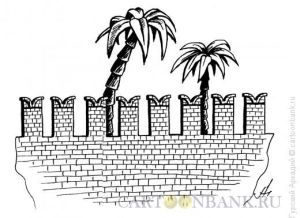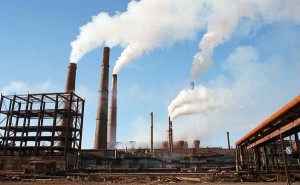 Since around the second part of the 2000s, the talk about the so-called “tumultuous 90s” has been ongoing in Russia. The complete collapse of the Soviet industry during that period is being discussed among other things. This is partly justified since a big part of the Soviet industry had been used to supply the arms race. However, with the collapse of the Soviet Union and the end of the Cold War, priorities changed. There were no more government contracts, and the majority of military and industrial enterprises were doomed to decline and shutdown. Today, if what Putin and Medvedev are saying is true, life in Russia is getting better. There is no crisis, and the economy is in full swing.
Since around the second part of the 2000s, the talk about the so-called “tumultuous 90s” has been ongoing in Russia. The complete collapse of the Soviet industry during that period is being discussed among other things. This is partly justified since a big part of the Soviet industry had been used to supply the arms race. However, with the collapse of the Soviet Union and the end of the Cold War, priorities changed. There were no more government contracts, and the majority of military and industrial enterprises were doomed to decline and shutdown. Today, if what Putin and Medvedev are saying is true, life in Russia is getting better. There is no crisis, and the economy is in full swing.
But this is, as they say, a look from behind the Kremlin walls. In reality, the wishes of Moscow leaders are rather unrelated to what is truly happening across the country. Day after day, residents of medium-sized provincial towns are seeing a completely different – actual — economic situation.
Take, for example, the city of Barnaul in the Altai region. Situated as far as about 3500 km from the self-indulgent Moscow, and with a population of 650 thousand people, Barnaul is neither a million plus city nor a small town. It often makes the news, and is neither at the top nor at the bottom of different ratings.
Once a developed industrial and agricultural province, today, the Altai region is primarily agricultural and highly subsidized. During World War II, around 100 industrial enterprises were evacuated from the European part of the country to the Altai region, and by the end of the 1980s, their number at least doubled. However, by the end of the 90s, the volume of industrial production in the Altai region reached only 30 percent of the level of the year 1990, and in the 15 years of Putin’s presidency, this index has never amounted to even 60 percent.
The lot of once profitable and much needed factories is not to be envied. Many of them have been converted into office buildings, malls or supermarkets. Others have been abandoned.
New shopping malls are being built on undeveloped sites across the city as well. Of course, such construction activity in itself creates new jobs for construction workers, salesmen, maintenance staff and transport companies. However, in order for malls to have buyers, and not only salesmen, one needs industrial production somewhere nearby since without it there is no economy. Simply put, if one has no job and no money, one can only go to a mall for window shopping.
Unfortunately, the situation in Barnaul is quite common, and the aforementioned facts apply to almost every medium-sized Russian city, be it Petrozavodsk or Volgograd.
The high level of corruption and the de-facto absence of protection against official misconduct and police abuse do not allow one to talk, even theoretically, about the development of any stable business, let alone any major industrial enterprise. The Russian government is not interested in changing the current situation. Having suffered practically no losses during the 2008 deep global economic crisis, officials came to believe that even the most catastrophic situation in the country would not affect their financial well-being. This is quite understandable since in the recent years, more than 50 percent of Russia’s budget have been coming from taxes and export customs duties on oil and natural gas. This is why the country is in turmoil every time oil price decreases even slightly.
 But how can one be certain that oil price will not decrease considerably and stay that way for a long time? Today, no one in the world can say for sure. Under such circumstances, conditions need to be created to promote the restoration and reprofiling of enterprises that went into decline in order to manufacture goods that could be in demand both in Russia and in the rest of the world. This is a difficult process, and the right opportunity to start it has been lost, but better late than never. Only in this way can the country gradually, step by step, become competitive, and, consequently, wealthy and successful. There is such a demand in society. The generation born in a capitalist Russia has already grown. These people want to work, they are willing to manufacture modern and popular goods so that they could spend their hard earned money on a variety of goods, comfortable housing without sweatshop mortgage loans, safe and affordable cars and other amenities without which life in the second decade of the 21st century is hardly imaginable.
But how can one be certain that oil price will not decrease considerably and stay that way for a long time? Today, no one in the world can say for sure. Under such circumstances, conditions need to be created to promote the restoration and reprofiling of enterprises that went into decline in order to manufacture goods that could be in demand both in Russia and in the rest of the world. This is a difficult process, and the right opportunity to start it has been lost, but better late than never. Only in this way can the country gradually, step by step, become competitive, and, consequently, wealthy and successful. There is such a demand in society. The generation born in a capitalist Russia has already grown. These people want to work, they are willing to manufacture modern and popular goods so that they could spend their hard earned money on a variety of goods, comfortable housing without sweatshop mortgage loans, safe and affordable cars and other amenities without which life in the second decade of the 21st century is hardly imaginable.
However, it appears that, just like children, Russian leaders hiding behind the Kremlin walls do not want to see reality as it is. The only difference is that children eventually grow up and begin to understand the ways of the world, whereas the Putin regime will never realize that.





